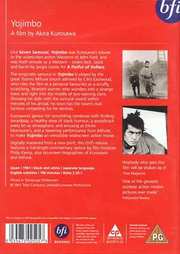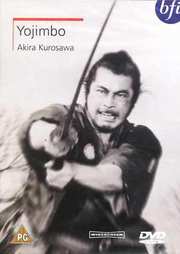Yojimbo (UK)
The story of the lone samurai who appears one day in a feuding gamblers town as a mercenary for sale
Certificate: PG
Running Time: 106 mins
Retail Price: £19.99
Release Date:
Content Type: Movie
Synopsis:
Later to be remade as A Fistful Of Dollars, Yojimbo is the story of the lone samurai who appears one day in a feuding gamblers town as a mercenary for sale. Clint Eastwood`s man with no name was never as magnificent as the great Toshiro Mifune, who here brings an ironic humour to a film which many critics consider to be one of the best action/adventure movies ever made.
The style and setting of the film owe much to Kurasowa`s admiration for the widescreen epis westerns of John Ford, and the soundtrack by Masaru Sato is more than equal to Morricone`s later score.
Digitally mastered from a new print, this DVD release features a full-length commentary option by film historian Philip Kemp, plus on-screen biographies of Kurasaswa and Mifune.
Special Features:
Audio commentary by film historian Philip Kemp
Video Tracks:
Widescreen Letterbox 2.35:1
Audio Tracks:
Dolby Digital Mono English
Subtitle Tracks:
English
Directed By:
Akira Kurosawa
Written By:
Akira Kurosawa
Ryuzo Kikushima
Dashiell Hammett
Starring:
Takashi Shimura
Kamatari Fujiwara
Eijirô Tono
Toshirô Mifune
Soundtrack By:
Masaru Satô
Director of Photography:
Kazuo Miyagawa
Editor:
Akira Kurosawa
Costume Designer:
Yoshirô Muraki
Production Designer:
Yoshirô Muraki
Producer:
Akira Kurosawa
Executive Producer:
Tomoyuki Tanaka
Ryuzo Kikushima
Distributor:
BFI Video


































Your Opinions and Comments
The incomparable Toshiro Mifune stars in Akira Kurosawa's visually stunning and darkly comic Yojimbo (The Bodyguard). In order to rid a village of corruption, masterless samurai Sanjuro turns a range war between two evil clans to his own advantage. Remade both as A Fistful of Dollars and, more recently, Last Man Standing, this exhilarating gangster-Western remains one of the most influential and entertaining genre-twisters ever produced. This version is the same print as the Criterion Edition.
If we adapt the language of horse breeders to the genealogy of films, one might write Yojimbo, by Shane out of Scarface. But while this odd coupling does suggest the most obvious hereditary traits of Kurosawa's black comedy, it fails to capture the joy with which he demolishes the clichés of the venerable genres he has appropriated.
A decade of achievement precedes this sport. After Rashomon had shocked both East and West by its triumph at the 1950 Venice Film Festival and became the first Japanese film ever seen by millions in the West, Kurosawa directed eight more films in the 1950s. Each was original in style, technically brilliant and visually arresting films often suffused with moral purpose and social significance. They were exotic for the Westerners, but alive with characters who continually impress us with their humanity. Half of these films have been hailed as masterpieces: Ikiru, Seven Samurai, Throne of Blood, The Lower Depths. And surely our feeling of shared humanity with Kurosawa's characters helped erase our cultural stereotypes about the Japanese created by World War II propaganda. Yojimbo comes as a sort of anticlimax at the end of this prodigious decade. Kurosawa, often called the most Western of Japanese directors, now seems to have thought, "Enough moral fervor. I'll show you how Western I can be," and selected two typically American genres for this demonstration. The lineage shows forth from the start. In a classic Western setting, with dust and leaves blowing across the wide, empty street that runs the length of a village, a lone stranger passes as frightened faces peer from behind shutters. Advised to leave because civil war is imminent, he prefers to stay, of course.
But Kurosawa's protagonist, Sanjuro, hardly fits the pattern of the handsome, clean-cut, peaceful, taciturn American Western hero who invariably chooses the right side and only reluctantly exercises his skill as a gunfighter to protect the weak against the wicked. Sanjuro is quite frankly a mercenary, a sword for hire, available to the highest bidder, with an attitude more akin to that of Sam Spade than of Shane. He scratches, twitches his shoulders, chews on a toothpick, and obviously relishes the use of his lethal talents. He doesn't hesitate to slay a few thugs just to demonstrate his skill or, once hired, to doublecross his gang and become "the bodyguard who kills the bodies he's hired to guard," as Pauline Kael writes. As a roninor wandering samuraihe has no loyalty and in Yojimbo there is no right side; each is equally bad. The village antagonists are not spawn of the classic Western but of the gangster film and, appropriately, Sanjuro's explosive bursts of violence have the impact of a submachine gun. Two bands of cutthroats hired by bosses in a dispute over gambling territory terrify the village. Sanjuro seeks work as a hired killer, but the grossness of his would-be colleagues so offends his sense of propriety that he happily sets about to eliminate all of them, as quickly as possible and as deviously as necessary.
Kurosawa converts the impending melodrama to comedy by abandoning his quest for fully human characters. Sanjuro is a Supersamurai, a whirlwind in combat; the village gangs are so grotesquely wicked, they become ludicrous and enlist neither our sympathy nor our belief. By the film's end most are dead, but we feel no regret at the slaughter, nor cringe at its execution. The exaggerated evil of the gangs leaves them no other appropriate fate, and theirs is achieved with such style and cinematic verve that we are exhilarated by the spectacle and not at all dismayed by its content.
Still, mayhem is the only work in his world. In classic Western style the whole film moves toward the final showdown in the dusty village street. But the actual violence either occurs off-screen or passes so quickly that you'll miss it if you blink. We know from Seven Samurai that Kurosawa can create as powerful and convincing a battle as any ever filmed, but in Yojimbo the most sustained scene of violence has no human victims but occurs as stage setting.
Toshiro Mifune achieved international stardom in Kurosawa's films of the 1950s, emerging as an actor of compelling power, capable of a great range and subtlety of expression. But as Sanjuro, no subtlety is necessarysheer physical presence suffices. In a film in which a company of fine actors have become puppets and caricatures, Mifune's Sanjuro is vital and almost credible, dominating the screen in a characterization conveyed centrally by a toothpick, a hitch of the shoulders, and the wholly assured swordsman's walk whose rhythm and power are enhanced by the music that usually urges him forward. Though Yojimbo lacks the intellectual challenge of Rashomon, the moral resonance of Ikiru, or the sweep and grandeur of Seven Samurai, it became Kurosawa's most successful film in Japan and his most influential in the West. It also spawned a whole new genre and a major film career in 1964 when Sergio Leone copied it almost shot for shot in the first "spaghetti" Western, A Fistful of Dollars, with Clint Eastwood in Mifune's role.
The transfer is in Tohoscope and black and white with the clarity of sound and picture you would expect from the BFI. Apart from the English subtitles the only extra is a very interesting commentary by film historian Philip Kemp. He points out quite a number of visual and sound cues that the Japanese audience would have noticed and understood but are lost on a western viewer.